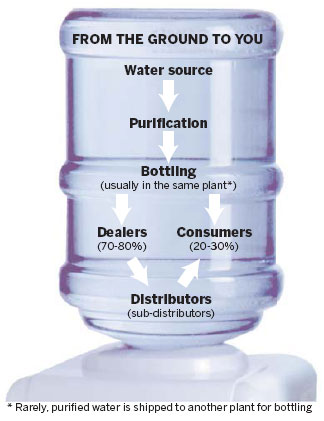Economy
Price isn't everything, but it provides clues to fakery
Updated: 2011-08-16 15:42
By Wu Wencong (China Daily)
|
 |
Most consumers know that the price of an 18.9-liter bottle of water - a "barrel" - usually varies from 13 to 20 yuan. What they don't know is that they may have paid different prices for the same product.
Wang Yuzhen, general manager of State-owned Jingrun Spring Co, has been in the industry for about 20 years. She said it is permissible, and common, for some brands to buy the water that they bottle from other companies. "The only difference between two bottles of water may be the labels, yet consumers pay much more for one of them," Wang said.
No retail, thanks
Wang's company produces its own water and sells it only to a fairly small number of large customers. "We don't do retail because I don't want to enter the chaotic market, which may ruin the reputation of our brand."
Her worries come from the link in the industry chain - which insiders call "the uncontrollable one" - of dealers and distributors.
Wang said water in dispenser-size bottles must be delivered to the customer. To boost market share, companies must set up stations all over a city to control transportation costs. It is expensive and troublesome for large brands to manage the stations on their own, she said, so they turn to dealers and distributors.
"If people from water stations fill the bottles with other water and don't return them to the factory, we will never know," Wang said. "And both purified water and mineral water should be kept under certain temperature and humidity levels without direct sunshine" to maintain quality.
"If people do find something wrong with the water, both they and the authorities will turn to the brands or producers," Wang said. "Usually no one will bother whether the problem lies with the dealers, because they are hard to track down."
Direct sales
Bai Yanjun is the executive manager of Kangtai Gaoke Co, which is among the few companies that produce and sell their own water brands directly to customers.
Prices with this choice are high because "the cost is high, and there is much more trouble." Transportation for retail sales adds 20-30 percent to costs, he said. The trade-off is a safer distribution channel.
He said some brands have no factories but lots of customers, saving them costs and trouble. And even some big distributors make more money than his company does, Bai said
His calculation was confirmed by Liu Chuanguo, manager of Yishengquan, one of the large agent dealers in Beijing.
Liu said annual profits for large brands run to tens of millions of yuan. It's a few million yuan for large dealers, he said, but for secondary producers, the profit is usually an order of magnitude lower.
Too good to be true?
Wang of Jingrun Spring said she recently saw a water station selling large jugs of water for 2 yuan each. It had a daily sales volume of 300. "The money they make is not even enough to cover the workers' labor, not to mention the cost of disinfecting and washing the barrels," she said.
A salesman from Beijing Zhongfu Co, a subsidiary of Zhuhai Zhongfu Enterprise, which is the largest producer of PC barrels in the market, said only about 40 percent of the barrels produced each year meet the appropriate standards.
"To prevent counterfeits, many large brands started in 2003 to use bottles shaped with special patterns," said the man, who asked to be unidentified. He said a good bottle costs more than 30 yuan.
Sang Yuncheng, a 28-year-old who has been distributing water for seven years, said he can't tell whether a bottle is qualified or not by simply looking at it.
The price is a clue, according to the dealer Liu. "For example, dealers buy Nongfu Spring at 12 yuan a barrel from the factory. The selling price should be set between 18 and 20 yuan, but customers' expected price is about 13 yuan. And if they can buy the water at that price, it is almost 100 percent substandard"

Specials

Star journalist leaves legacy
Li Xing, China Daily's assistant editor-in-chief and veteran columnist, died of a cerebral hemorrhage on Aug 7 in Washington DC, US.

Robots seen as employer-friendly
Robots are not new to industrial manufacturing. They have been in use since the 1960s.

Smurfs up in China
The movie remake of a classic 1980s cartoon series is expected to have special cross-generation appeal to Chinese filmgoers